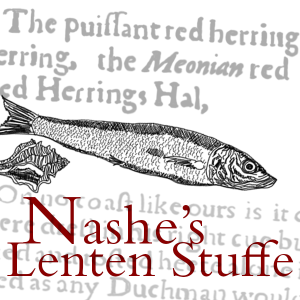Nashe's Insults
Crusty cum-twang

-
For old misers: 'crusty cum-twang'
In the opening pages of his mock encomium Lenten Stuffe, Nashe shows his disgust for patrons who had rejected a poet as great as Homer, as well as their hypocrisy in trying to profit from his fame after his death:
“those graybeard Huddle-duddles and crusty cum-twangs, were stroke with such stinging remorse of their miserable Euclionisme and snudgery, that [Homer] was not yet cold in his grave but they challenged him to be borne amongst them….every one of them laying claime to him as their owne”
(Lenten Stuffe, 1599, p.3)
Huddle-duddle, a compound noun made up of:
Huddle= "A miserly old person; a hunks" (OED). John Lyly, a writer whose 'Euphuistic' style of writing Nashe imitates in his earliest work, The Anatomie of Absurditie, is credited by the OED as the first person to use the word 'huddle' to escribe a miser: "So these olde huddles having overcharged their gorges with fancies" (Lyly, Euphues, 1578).
Duddle = "To confuse, muddle" (OED). In popular usage since the mid sixteenth century.
Crusty cum-twang, an insult made from combining:
Crusty = literally "hard like a crust", but when used in a figurative way to describe people, it describes someone who is "Short of temper; harshly curt in manner of speech: the opposite of suave or affable" (OED). The word dates back to c.1570, but was used by Nashe and his fellow writers, John Lyly and William Shakespeare to describe curmugeonly characters.
cum-twang= Has its very own entry in the OED as a Nashe neologism, and described simply as "An obsolete term of contempt." 'Cum' is the Latin preposition 'with', while 'twang' comes from an older insult: 'huddle and twang' (OED), which is first recorded in John Lyly’s Euphues (1578): "Though Curio bee olde huddle and twange" as well as in John Florio's Italian phrase-book Second Frutes (1591): "Who lets his wife goe to everie feaste...Shall have...of his best wife a twang with a huddle". Nashe has exaggerated the insult by splitting the term into two separate phrases: ‘huddle-duddle’ and ‘crusty cum twang’.
Euclionisme = "Stinginess" (OED), and seemingly a Nashe neologism, derived from the name of the miser in Plautus' Aulularia, 'Euclion'.
snudgery = "Miserliness" (OED), again a Nashean neologism, derived from "snudge", a word first used by Roger Ascham in 1545 in Toxophilus, and defined as "A miser, a mean avaricious person, a niggard; a sneaking or sponging fellow" (OED). 'Snudging' was later used in East Anglian dialect to mean 'Penurious, greedy, sordid' (See John Greaves Nall's Glossary of East Anglian Dialect, 1866).
Kate De Rycker
Last modified: Mon, 05 Sep 2016 13:12:06 BST




